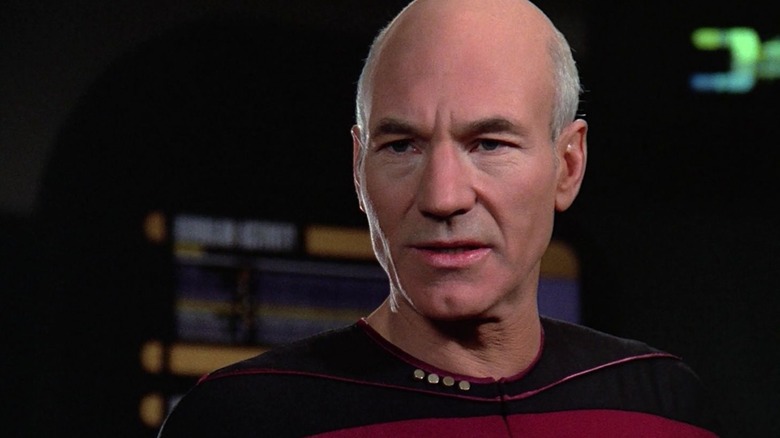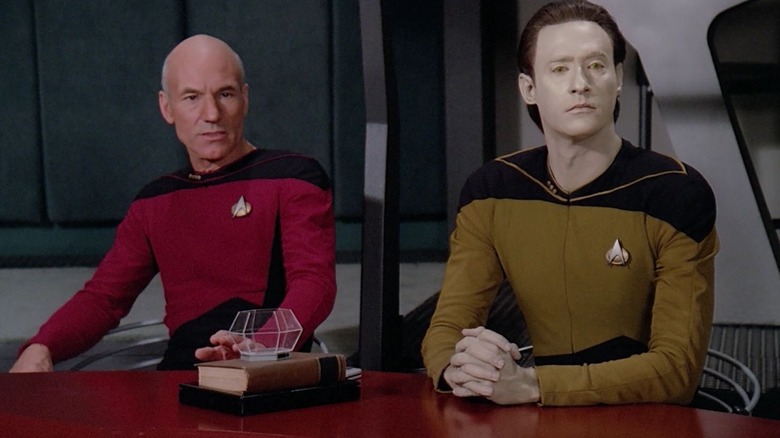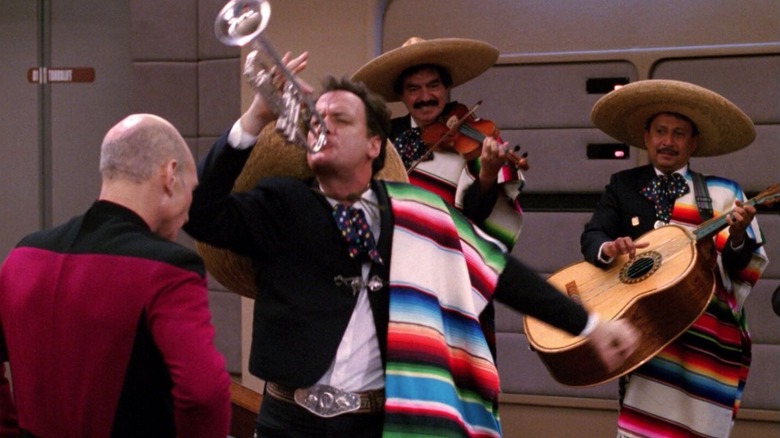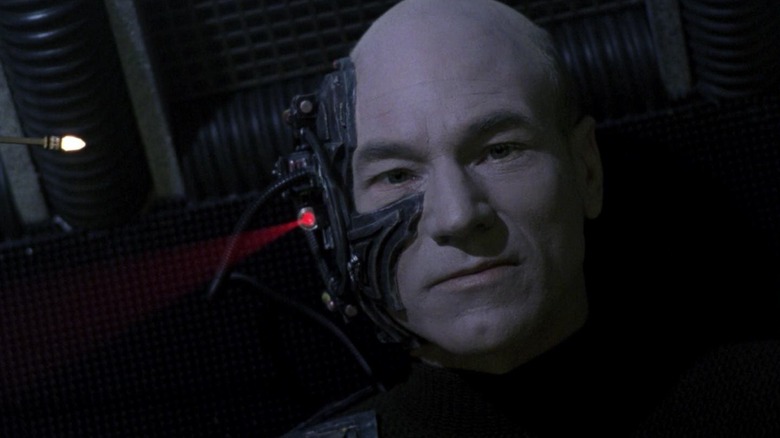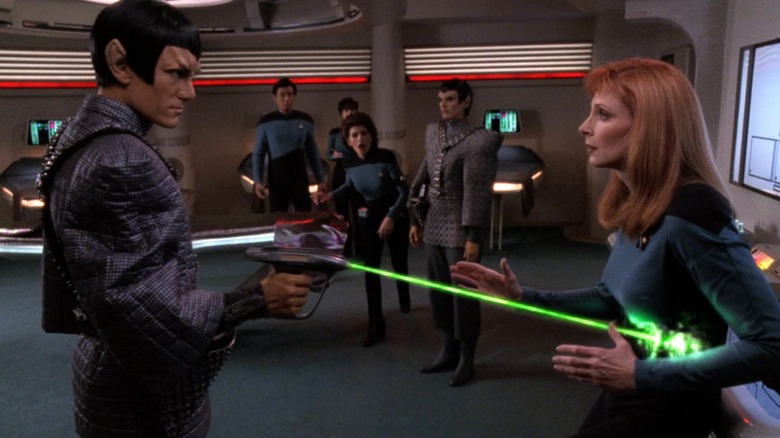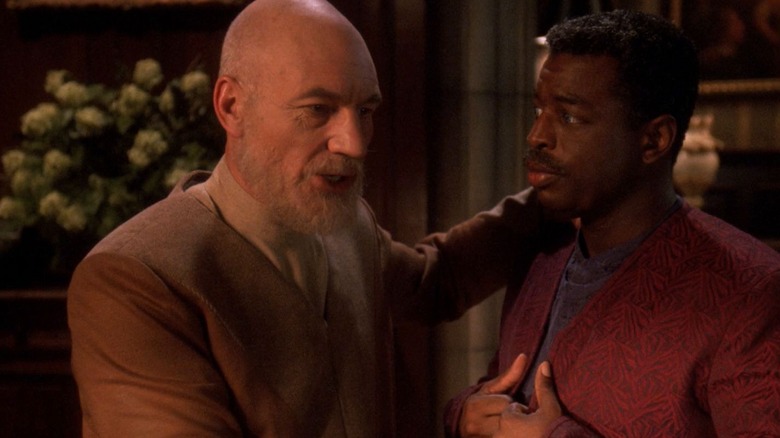5 Essential Star Trek: The Next Generation Episodes That Everyone Should Watch At Least Once
It's amusing to think that Gene Roddenberry created "Star Trek: The Next Generation" pretty much out of spite. The story goes that Roddenberry was heavily involved in 1979's "Star Trek: The Motion Picture," a heady, slow-moving, and epic rendition of his 1966 TV series. When the film didn't do as well at the box office as the studio hoped, Roddenberry was essentially locked out of participating in further film projects. This became galling when the second, third, and fourth "Star Trek" movies (released in 1982, 1984, and 1986) became massive hits. 1986 was also the year Roddenberry started putting together his ideas for a "Star Trek" spinoff that was set a century after the events of the original series. It was to be set on a new version of the U.S.S. Enterprise, and feature an all-new cast. Most importantly, Roddenberry would be in total control.
Although the first two years of "Next Generation" were notoriously rocky, it eventually hit its stride, becoming one of the best sci-fi shows of its era, possibly of all time. Roddenberry's themes of peace, multiculturalism, and diplomacy were more carefully explored than on the original "Star Trek," and the characters began to expand into the pop consciousness. The series was often intelligent, and the scripts were deliberate in their thesis on ethics, psychology, politics, and technology. It also had plenty of crackerjack "crisis of the week" episodes wherein the crew had to use their wits to solve a new bizarre cosmic mystery.
The series lasted seven amazing seasons, and led into four lackluster feature films. The series eventually became so widely regarded that it was revisited in shows like "Star Trek: Lower Decks" (set in the same timeline) and "Star Trek: Picard" (about the central NextGen captain, played by Patrick Stewart).
Below are five essential episodes of "Star Trek: The Next Generation." Know that "essential" doesn't necessarily mean "best." The selections below are emblematic of what "Next Generation" was capable of.
The Measure of a Man
The first season of "Next Generation," as mentioned, was pretty rocky, and you'll find some of the show's worst episodes there. The second season was a little better, as the series started to find its feet. There was still a lot of chaff with the wheat, but at least there was more wheat (not to strain a metaphor). The first truly great episode of "Next Generation" was also one of its most essential. "The Measure of a Man" was about a snippy Federation scientist named Bruce Maddox (Brian Brophy) who was fascinated with the Enterprise's second officer, Data (Brent Spiner). Data, an android, was built by a presumed-dead scientist, and was so amazingly complex, no one else had been able to recreate his construction. Maddox wanted to force Data to a Starfleet cybernetics lab and dismantle him, assuming he could recreate Data from scratch.
This led to the central question of the episodes: what rights does Data have in this matter? He was artificially constructed, and possessed artificial intelligence, but did that make him alive? Was he an individual, or was he an object "owned" by Starfleet? The bulk of "Measure" is a trial wherein Picard had to defend, in a court of law, the personhood of Data. Riker (Jonathan Frakes) had the unfortunate task of serving as the prosecution, proving Data wasn't alive.
This is not only a great character episode, but proves that "Star Trek" was interested in topics like personal rights, and the bureaucratic litigation that aid rights must undergo. It also explored the fineries of a Turing Test, questioning how much free will Data possessed, even as an artificial, unemotional being. Viewers know Data is alive, but how would be prove it in a court of law?
Déjà Q
Q (John de Lancie) was the impish trickster god of "Star Trek," using his omnipotence to put humanity on trial in NextGen's pilot episode. He would reappear periodically to cause havoc and play pranks, providing a cynical and whimsical counterpoint to the ordinarily stuffed-shirt "Next Generation" characters. Sometimes his antics were threatening (he introduced the Enterprise to the Borg, for instance), although for the most part, he was playful (he once transformed the Enterprise crew into characters from Robin Hood).
"Déjà Q" might be the most emblematic Q episode, as the crew was forced to spend an extended period with him. This time, however, Q has been transformed into a human by his omnipotent overseers, a punishment for his notorious galactic cruelty. In order to return to his powerful self, Q will have to display an act of humility, something he doesn't have any experience with. Q is especially funny in this episode, and the crew are all annoyed by his superior attitude. Worf (Michael Dorn) logically points out that, to prove he is indeed human, all Q needs to do is die. Several characters get to explain mortal life to Q, and he is aghast at all of it. Eating? Sleeping? Bathing? Ew, ew, ew. Eventually Q will indeed learn to be humble, but not before pissing off everyone in the galaxy. Of course, because Q is an immortal god, the humility won't last. He gets to go back to being an a-hole in due time.
"Star Trek: The Next Generation" is best when it can offer audiences a fresh perspective on humanity, and its gods, androids, and aliens, allow human viewers to examine themselves — Socrates-like — from an outsider's viewpoint. How would you explain ethics to a fallen deity? And one who hates humanity? The mind reels.
The Best of Both Worlds
It goes without say that the two-part episode "The Best of Both Worlds" is essential viewing. This episode was one of the most notable TV cliffhangers of all time, forcing Trekkies to wait a full summer for its conclusion. The first part ended with Captain Picard assimilated by the malevolent cyborgs The Borg, and in a position to attack the Enterprise. Riker, promoted to Captain, gives the order to fire weapons on the Borg-ified Picard. Cut to black, see you in September.
"Both Worlds" is significant for multiple reasons. For one, Picard's assimilation into the Borg — and his subsequent escape — will come to inform many, many "Star Trek" stories thereafter. As the Borg Locutus, Picard led an assault on Earth that killed 11,000 people. That's not something he'll easily overcome, psychologically. The Locutus story will eventually be the basis of the 1996 film "Star Trek: First Contact," and undergird much of "Star Trek: Picard." The episode was so exciting that the Borg were re-used time and time again throughout the franchise, well past the point of them being threatening.
"Both Worlds" is also the end of Riker's character arc. Riker was a careerist who loved being a first officer, but who sought his own command. In "Both Worlds," he realized his career had stagnated, having turned down the command positions he thought he wanted. He was allowed to be captain of the Enterprise, but had to face the fact that he was happier in a secondary position. He lets a more ambitious officer (played by Elizabeth Dennehy) supplant him.
Also, "Both Worlds" is just a grand, exciting story. It has action, but it's employed sparingly. Picard gets to speak to the Borg collective, and comes to truly understand the depths of its soullessness.
Timescape
There are many marvelous "problem of the week" episodes on "Star Trek," wherein a grand disaster occurs, and each member of the Enterprise crew has to find a way to solve it. These episodes are the backbone of "Star Trek," showing the characters at their professional best. "Star Trek" is, after all, a workplace series, so it's comforting to see stories wherein Starfleet officers are operating at their best, and using their wit and intelligence to solve ineffable spatial conundra.
One of the better examples of a disaster episode is "Timescape," an episode wherein the Enterprise becomes frozen in time. Troi (Marina Sirtis), Geordi (LeVar Burton), Data, and Picard return from a symposium to find the Enterprise and a Romulan ship, suspended in time, locked in the heat of some kind of conflagration. Whatever happened during the scuffle shattered the space-time continuum, leaving the ships frozen. The central quartet will have to find a way to explore the ships and solve the mystery. They find that the disaster is worse than they imagined. Dr. Crusher (Gates McFadden) is being murdered, and the Enterprise's engine core is in the middle of exploding. Also, there are mysterious Romulans lurking about in the background. "Timescape" is eerie, and the scenes of the main characters walking around on the frozen Enterprise are just as much "Twilight Zone" as "Star Trek."
There is nothing about "Timescape" that adds to the show's over-arching mythology, nor are there any profound character moments that rewire anyone's brains. It's just a good, solid problem-solving episode with some fun visuals, a cool concept, and a clever solution. If "Star Trek" was at least one-third disaster episodes, then this is a good one to guide them all by.
All Good Things...
The final two-part episode of "Next Generation," "All Good Things..." is easily one of its best, and a vital conclusion to any "Next Generation" marathon. It's also a great sequel to "Encounter at Farpoint," the show's pilot, connecting the end back to the beginning, in more ways than one. In "All Good Things...," Picard finds himself unstuck in time, a la "Slaughterhouse-Five." He finds himself uncontrollably skipping from the present to the past, seven years earlier, when he came aboard the Enterprise for the first time. Then he finds himself an old man, decades in the future, dying of a rare brain ailment. Past, present, and future collide.
The future sequences are good character-building moments. Riker is a bitter old admiral, Geordi became a novelist, Dr. Crusher became a starship captain, Data became a professor (with emotions!), and Worf became a Klingon ambassador. Troi, sadly, died. We can see the future of these characters, comforted that they will grow and change over time, or perhaps saddened by their melancholy fates. The story of "All Good Things..." also revisits Q's trial of humanity, and Q explains everything to Picard. Is he responsible for the time skips? And why does Q keep saying that Picard is fated to destroy humanity? Perhaps it has something to do with the strange spatial phenomenon that grows larger the further backward in time it travels.
It's a heady episode, but also appropriately emotional. It's a logic puzzle, a fan-placating "what-if" episode, and a great character piece rolled into one. If you've only seen the above four episodes before it, you'll still likely be swept away by the drama and cleverness of "All Good Things..." Of course, if you had been watching every single episode of "Next Generation" for the previous seven years, it will certainly hit much harder.
